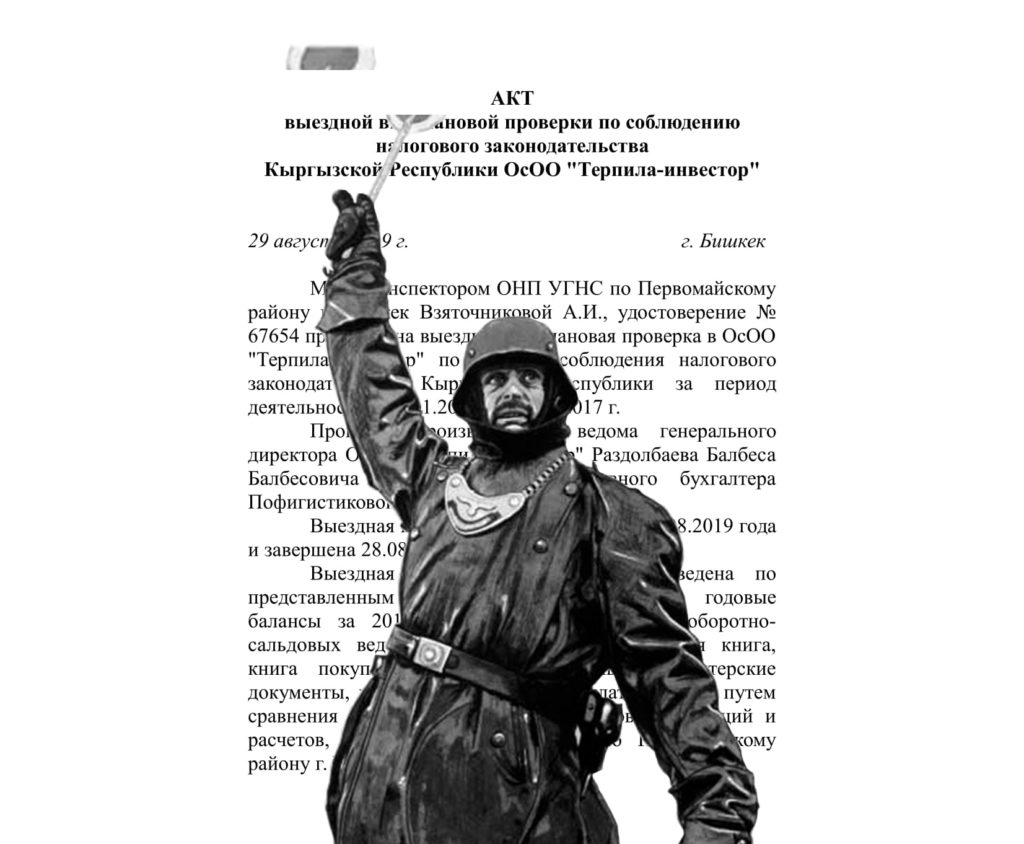«Economists» traditionally act in a completely different repertoire — they propose initiatives to reduce the administrative burden, reduce taxes, refuse inspections, and so on.
But this summer, something went wrong. And the Ministry of Economy came up with an initiative that directly affects business and the investment climate, while creating a tax-power trough of an unprecedented scale. We are talking about a bill that the founders, directors and accountants of companies with tax debts will be prohibited from traveling abroad.
In fairness, we note that, most likely, the bill was developed outside the Ministry of Economy, and through them it was simply “thrown in”. But it’s still embarrassing. They could at least resist.
According to the draft law, it is supposed to «restrict the exit of citizens of the Kyrgyz Republic who are the head, chief accountant and / or founder of entities, in connection with the existing debt to the budget for taxes, insurance premiums and non-tax payments.»
Everything about this bill is bad. We don’t even know where to start.
First, it is against the Constitution.
Article 25 of the Constitution of the Kyrgyz Republic.
• Everyone has the right to freedom of movement, choice of place of stay and residence in the Kyrgyz Republic.
• Everyone has the right to freely travel outside the Kyrgyz Republic.
Restrictions on leaving may be established in cases provided for by laws, but all these cases are connected in one way or another with personal obligations or restrictions of citizens. For example, if a person under investigation as a suspect is either convicted or evades the obligations imposed by the court. But in these cases, the person himself did something wrong and for this he was limited in movement. If the chief accountant is “locked up” in the country simply because the company he just got a job has calculated taxes for some old period, this is an unconstitutional punishment without guilt. It is impossible to punish without guilt, this is a constitutional principle.
The draft law also contradicts the international obligations of the Kyrgyz Republic. In 2004, Kyrgyzstan ratified (by the Decree of the Jogorku Kenesh of January 12, 1994 No. 1406-XII) two fundamental international human rights treaties — the Universal Declaration of Human Rights of December 10, 1948 and the International Covenant on Civil and Political Rights of December 16, 1966, and the Optional Protocol to that Covenant. Freedom of movement is guaranteed by these documents as categorically as in the Constitution itself. And the Optional Protocol also allows you to complain about violations to the Commission on Human Rights at the UN, which is not very good for the international image of the country.
The bill creates such anti-advertising for investments in Kyrgyzstan that it is hard to imagine. Any foreigner who wants to open or buy an enterprise in Kyrgyzstan will think three times before doing so if the law is adopted. There are legends about the lawlessness of the tax authorities in our country, and due to the presence of a rigid attitude to the courts not to make decisions in favor of taxpayers, those who have fallen under the tax rink actually have no chance of judicial protection. And now they’re adding travel restrictions. To finally convince all investors that this country should be avoided like fire.
While the President is struggling to convince the public that an uncompromising fight against corruption is necessary, the bill of the Ministry of Economy gives our tax authorities a unique tool for extorting bribes.
Ekonomika is aware of the illegal practice of the State Tax Service: tax officials, without waiting for the consideration of a complaint against a decision on tax assessment, enter information on the presence of tax debts into the taxpayer’s electronic card. And while the internal appeal procedure is underway, and then litigation, the electronic data on the company already says that it owes taxes to the budget. Accordingly, the ban on the state border will be transferred immediately. Or not, as agreed.
There will be another corruption scheme based on this legislative initiative. Imagine, companies have counted unpaid taxes. And they put its participants, the director and the accountant on the black list for crossing the border. Then the accountant and the director quit, and the participant sold his share to another. Formally, they should be excluded from the list, since they no longer fall under the criteria of the law. But will they? It’s like an agreement.
In fact, the bill creates a hostage-taking system in the country. In another way, one can understand the restriction on the departure of a director who deliberately evaded taxes, fell under investigation for evasion and, in connection with this, is now under law enforcement pressure.
But nothing outrages people more than injustice. The Kyrgyz people have this feeling especially developed. Why should people be found guilty without guilt? What is the fault of the minority shareholder of the company whose managers lost the tax dispute? What is the fault of the chief accountant, whose work, by definition, includes only accounting for the company’s operations and reporting? What is the fault of the director, who, due to a business failure, could not leave the necessary amount for paying taxes on the company’s current account? What if the tax violation occurred before he became a director?
In fact, all these people are hostages. The state does not care if they are guilty or not guilty. It simply cannot live within its means and therefore decided to beat taxes by any means. In parallel, hanging noodles on everyone’s ears about a «favorable investment climate.»
We appeal to the deputies of the Jogorku Kenesh, who will receive this bill for consideration this autumn. Do not disgrace the country, cut him down immediately. And make it clear to those who are “pushing” him, so that parliament is no longer disturbed by laws on taking hostages.
Legislative moves designed to create fertile ground for corruption and to consolidate power resources are typically anticipated from any entity, except perhaps, the Ministry of Economy.
Conventionally, «economists» engage in a quite different manner. They suggest initiatives to lessen the administrative burden, lower taxes, eliminate inspections, and so forth.
However, this summer, an unexpected turn of events occurred. The Ministry of Economy introduced an initiative that directly impacts businesses and the investment climate, while simultaneously establishing a tax-power nexus on an unprecedented scale. The matter at hand is a bill proposing to prohibit the founders, directors, and accountants of companies with tax debts from traveling abroad.
In the interest of fairness, it should be noted that this bill was likely drafted outside the Ministry of Economy and was merely funnelled through it. Yet, this remains troubling. The Ministry could have at least offered some resistance.
According to the proposed law, it aims to «restrict the departure of citizens of the Kyrgyz Republic who are the head, chief accountant and/or founder of entities, due to existing debts to the budget for taxes, insurance premiums, and non-tax payments.»
There are numerous issues with this bill, and it’s challenging to determine where to begin.
Firstly, it is unconstitutional.
Article 25 of the Constitution of the Kyrgyz Republic states:
• Everyone has the right to freedom of movement, choice of place of stay and residence within the Kyrgyz Republic.
• Everyone has the right to travel freely outside the Kyrgyz Republic.
Exit restrictions can be established under circumstances specified by law, but all such instances are somehow tied to personal obligations or restrictions of citizens. For instance, if an individual is under investigation as a suspect, either convicted or evading court-imposed obligations. However, in these cases, the individual themselves have committed a wrongdoing, warranting the restriction of movement. Limiting the chief accountant’s freedom to travel simply because the company they recently joined has outstanding taxes from a previous period is an unconstitutional punishment without proven guilt. Punishment without guilt is in breach of a fundamental constitutional principle.
Moreover, the draft law is in violation of the Kyrgyz Republic’s international obligations. In 2004, Kyrgyzstan ratified two fundamental international human rights treaties — the Universal Declaration of Human Rights of December 10, 1948, and the International Covenant on Civil and Political Rights of December 16, 1966, along with its Optional Protocol (under the Decree of the Jogorku Kenesh of January 12, 1994 No. 1406-XII). These documents unequivocally guarantee freedom of movement as firmly as the Constitution itself. The Optional Protocol also provides the means to report violations to the UN’s Human Rights Commission, which could be damaging to the country’s international reputation.
The bill constitutes such a deterrent to investment in Kyrgyzstan that it’s difficult to fathom. Any foreigner contemplating the establishment or acquisition of a business in Kyrgyzstan will undoubtedly reconsider if this law is enacted. The notoriety of our tax authorities» arbitrariness is widespread, and due to the courts» stern tendency not to rule in favour of taxpayers, those caught in the tax dragnet have virtually no chance of judicial protection. Now, travel restrictions are being added to the mix, further deterring investors from considering this country.
While the President endeavours to persuade the public of the vital need for an uncompromising fight against corruption, the Ministry of Economy’s bill arms our tax authorities with a unique instrument for the solicitation of bribes.
Ekonomika has knowledge of the illicit practices of the State Tax Service: tax officials, without waiting for the review of a complaint against a tax assessment decision, record the existence of tax debts in the taxpayer’s electronic card. While the internal appeal process unfolds, followed by litigation, the electronic data on the company already indicates that it is indebted to the budget. Accordingly, the travel ban at the state border will be enforced immediately. Or perhaps not, depending on the agreement.
This legislative initiative paves the way for another corruption scheme. Picture this: companies have calculated unpaid taxes and subsequently placed its participants, the director, and the accountant on the blacklist for border crossing. Then, the accountant and the director resign, and the participant sells his share to another. Formally, they should be removed from the list as they no longer meet the criteria of the law. But will this happen? It seems to be a matter of negotiation.
Effectively, the bill establishes a system of hostage-taking within the country. The restriction on the departure of a director who intentionally evaded taxes, fell under investigation for evasion, and as a result, is now facing legal pressure, can be comprehended.
However, nothing incenses people more than injustice. The Kyrgyz people are particularly sensitive to this sentiment. Why should people be deemed guilty without proven guilt? What is the fault of the minority shareholder of a company whose managers lost the tax dispute? What blame lies with the chief accountant, whose job, by definition, involves only accounting for the company’s operations and reporting? What guilt does the director bear, who, due to business failure, couldn’t reserve the necessary funds for tax payment on the company’s current account? What if the tax violation transpired before they assumed their role as director?
In reality, all these individuals are hostages. The state shows indifference towards their innocence or guilt. It simply cannot sustain itself within its budget and therefore decided to aggressively collect taxes by any means necessary, while hypocritically promising a «favourable investment climate.»
We appeal to the deputies of the Jogorku Kenesh, who will be considering this bill come autumn. Do not tarnish the country’s reputation; reject it outright. Make it clear to those who are «pushing» this bill, so that parliament is no longer troubled with laws that take hostages.





